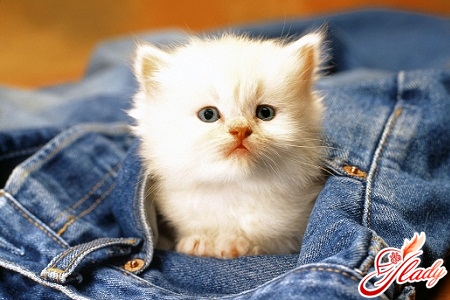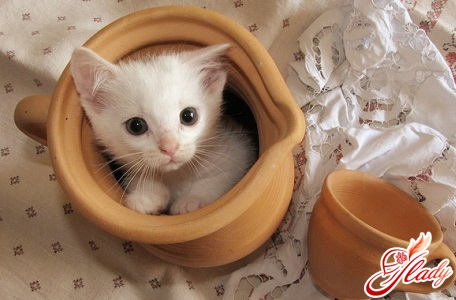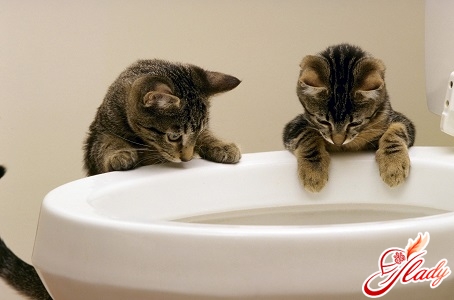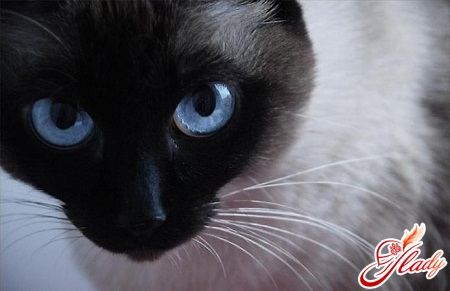 When your cat is healthy, you are in a good mood too.good: the soul does not hurt, and the heart does not break from pity for the sufferer. But, alas, our domestic cats and kittens also get sick. Moreover, there are probably no fewer diseases that can overtake our pets than human diseases. Among them there are both exclusively feline diseases and diseases similar to human ailments. One of such diseases is cystitis. Moreover, of all domestic animals, it is cats that suffer from cystitis most often, and male cats, oddly enough, are at greater risk than females. However, this disease, although unpleasant, is not fatal. If you start treating the animal in time and correctly, it will soon become healthy, and your conscience will be clear and your soul will be at peace. Let's find out what kind of disease it is, where it comes from, how cystitis manifests itself in cats and male cats, and how to treat it.
When your cat is healthy, you are in a good mood too.good: the soul does not hurt, and the heart does not break from pity for the sufferer. But, alas, our domestic cats and kittens also get sick. Moreover, there are probably no fewer diseases that can overtake our pets than human diseases. Among them there are both exclusively feline diseases and diseases similar to human ailments. One of such diseases is cystitis. Moreover, of all domestic animals, it is cats that suffer from cystitis most often, and male cats, oddly enough, are at greater risk than females. However, this disease, although unpleasant, is not fatal. If you start treating the animal in time and correctly, it will soon become healthy, and your conscience will be clear and your soul will be at peace. Let's find out what kind of disease it is, where it comes from, how cystitis manifests itself in cats and male cats, and how to treat it.
What is cystitis?
Cystitis in veterinary medicine is classified asinfectious or inflammatory disease of the urinary tract. Cystitis itself is an inflammation of the mucous membrane of the bladder, but if it is accompanied by urethritis (inflammation of the urethra), then it is already complex and is called urocystitis. Cystitis can be chronic or acute, and chronic (with constant relapses) cystitis usually occurs in older animals. Each form of cystitis is characterized by both general and specific symptoms. Acute cystitis manifests itself, first of all, in the violation and pain of urination, and chronic cystitis - bleeding in the bladder. For cats, cystitis is dangerous due to complications in the form of obstruction (blockage) of the urethra with mucous plugs, which completely block the outflow of urine. In this situation, the pressure in the bladder and renal pelvis increases, which leads to blockage of the kidneys. This complication is very dangerous and can result in the death of the cat in a short period of time (from one to two days).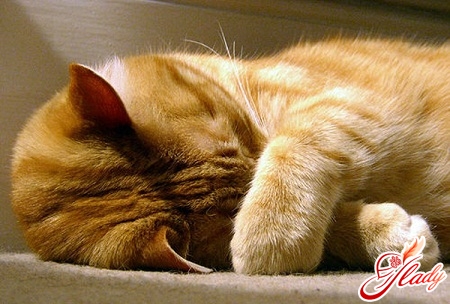
Causes of the disease
Cystitis rarely occurs in cats on its own." to yourself". Most often, it is caused by a common cold from drafts or the cat constantly lying on cold tiles. Sometimes cystitis can be a complication of another disease. It can be caused by pyelonephritis, and bladder stones, and parasites living in the urinary organs. For neutered cats, the risk of disease is significantly higher, since their genitourinary system functions differently than that of full-fledged males. The risk of disease is also increased by improper feeding of the animal, when the diet mainly includes dry food and a small amount of water. Studies have shown that prepared foods change the acid-base reaction of urine, which contributes to the formation of special salts, disrupts the function of the bladder and provokes the occurrence of cystitis. And another cause of cystitis in cats is urinary tract infections, which can even be a consequence of mating games. In any case, the disease will not go away on its own and must be treated.
Symptoms of the disease
The symptoms of this disease cannot remainunnoticed. The very first symptom of cystitis is a frequent urge to urinate. The sick animal goes to the litter box more often, and sometimes tries to pee in completely inappropriate places (on furniture, carpets, etc.). This behavior is not a whim, but an attempt to get rid of the pain that accompanies the animal when trying to go to the usual litter box. If you are familiar with this disease firsthand (rarely what woman has not suffered from cystitis), then you should understand how painful this condition is. With cystitis, every trip to the toilet of a cat is just torture. The process itself is very painful, little urine is released, or none at all. The urine acquires a dark color and becomes cloudy from impurities of blood, mucus and pus. And another of the clear signs of the disease is a specific, strong and pungent smell of urine, which appears even in castrated cats and sterilized cats. In addition, feline cystitis depresses the general condition of the animal: the cat becomes lethargic and apathetic, refuses food, and feels thirsty. Cystitis is often accompanied by high fever, vomiting, and pain. Sometimes the animal becomes overly restless, rushes around the room in search of a secluded place, ignores the litter box, moves its hind legs and often changes their position - these are also symptoms of cystitis.
Determine the severity of the disease
If you have the slightest suspicion thatthat the animal has cystitis, if at least some symptoms have appeared, then be sure to try to determine the severity of the disease. This is especially true for sick cats, which are generally prone to diseases of the genitourinary system. First of all, pay attention to the violation of urination, because further diagnosis will depend on this symptom. If there are no violations, and everything happens as usual, then look at the volume of urine excreted: if a cat or a cat urinates more than usual, this may be a sign of diabetes, kidney dysfunction or other diseases. Next, you need to answer a number of questions, carefully observing the animal and identifying the symptoms:
- How often does the cat go to the toilet "in a small way"?
- Does she behave as before, or is it long and intense?
- Did the urine show a specific odor that was previously absent?
- Has the color of urine changed, did not blood or mucus appear in it?
- Does the animal have vomiting?
- Are there signs of dehydration? To determine the degree of dehydration, grab your fingers on the skin on the back of the cat, lift and quickly release. If the fold slowly unfolds, then the animal is dehydrated.
- Did not your pet become listless and apathetic?
- Have such signs been observed before, or is this the first time?
So, if the answers to all these are positive,questions, you should immediately contact your veterinarian. Do not delay your visit, because an advanced disease takes longer and is more difficult to treat, because your animal suffers, and because all this can end very sadly (especially for cats). If such symptoms are not observed or only one of them is observed, try to transfer the cat to a corrective diet. Because individual signs may not be symptoms of cystitis, but, for example, consequences:
- recent vaccination;
- fight your cat with other bully;
- malnutrition.
If after a couple of days of dieting the cat's condition does not improve, and your suspicions do not subside, take the animal to the veterinarian, who will make the correct diagnosis and prescribe treatment.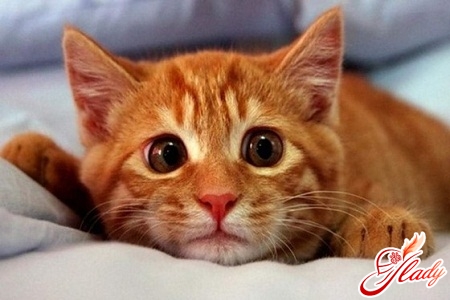
Treatment of cystitis
Of course, your pet's treatment shouldundergo only under the supervision of a doctor, who will prescribe certain medications and a regimen for their use. Most often, for this disease, a veterinarian prescribes diuretics. If the disease is severe, then bladder lavage procedures with antimicrobial drugs (furacilin, potassium permanganate, etc.) are also possible. In the case where cystitis has become a complication of another disease, then the cat will be treated for it as well. For example, with urolithiasis, surgical intervention is not excluded. If the cause of the disease was an infection, or infectious complications have arisen, then the doctor will prescribe treatment with appropriate drugs (urosulfan, furadonin). In case of helminthic invasion (and cystitis as a consequence), you will have to give the animal anthelmintic drugs. And if the disease is accompanied by pain, then, most likely, your cat will also be prescribed painkillers. However, treatment of a cat with cystitis is not limited to medical procedures: the animal needs certain care. And there are universal recommendations on this matter. First of all, provide the animal with peace and warmth: lay a soft bedding and put a heating pad nearby. Make sure that the cat always has access to fresh water, and that the water itself is always present in the bowl. And be sure to follow all the recommendations of the veterinarian. Your attention, care and responsibility will help the animal recover no less than medication. Remember that cystitis in cats and cats is treatable, even if it is severe, and you are always responsible for those you have tamed! We recommend reading:




